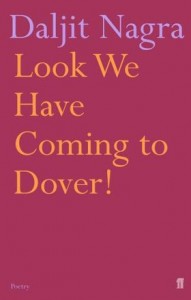
Opening Nagra’s award-winning debut collection Look We Have Coming to Dover! is a poem meant to be heard, not read, starring an Indian immigrant to Britain, a newly-married, drinking, dancing workingman, brimming with energy and appetite. A more lovable version of Berryman’s Henry/Mr. Bones, he is talking to us, we are almost certain, though we don’t know who he thinks we are. With a vulgar voice uncannily reminiscent of one’s Punjabi uncle, the speaker is of a sort rarely (successfully) rendered in Indian Diaspora poetry, which has hitherto featured elegant, editorial speakers who wield the Queen”s English with ease, self-consciousness, and occasional guilt. Not told through the mediation of second or third generation children, nor the subdued hindsight of a grandfather, the poem and its speaker make of the past the present.
On one hand, Nagra does what poets do with their immigrant speakers. Things exist in pairs: his English pop culture references are mixed with Punjabi syntax, he tangos to the Pakeezah record, his wife makes him roti at home while his mate Jimmy John’s girlfriend shoves “his plate of / chicken pie and dry white / potato” at him “like Hilda Ogden”. In nearly each line, Nagra gives the speaker both the ordering force of Old English style alliteration and conversational idiosyncrasies, making him at once a bard and an enthusiastic friend. This happens right off the bat, in the memorable first stanza: “Di barman’s bell done dinging / so I phone di dimply-mississ, / Putting some gas on cookah, / bonus pay I bringin!”
On the other hand, the polarity between English and the speaker’s “Punglish” diminishes when we read the only other italicized dialogue in the poem, spoken by Jimmy John’s girlfriend: “Heeya, eaht yor chuffy dinnaaah!” And as the poem progresses, it becomes difficult to distinguish between the dualities the speaker contains, until they become one in the final sentences: “Darling is so pirouettey with us / for whirlwind married month, / that every night, though by day / we work factory-hard, she always / have disco of drumstick in pot. / Hot. Waiting for me.” No longer taking turns, there is at once linguistic convolution and eloquence, marriage and bachelorhood, food and sex, weariness and humor, tenderness and machismo, et cetera.
Nagra complicates the more-than-oft-discussed binaries that exist in the immigrant (Punjabi versus English, opportunity versus nostalgia, for instance) with a verisimilitude rare in other Diaspora poets. In “Darling and Me!” these binaries do not merely push against each other, interacting at the interface. Rather, they enter and become each other, become a new territory that is bordered by neither Old Country. The shortcomings of the speaker’s English—the run-on sentences, adverbs acting like verbs, the expressionism of a barely-comprehensible chain of monosyllabic words, the gerunds that take the places of indicatives—fuel the eloquence and velocity of a voice that celebrates rather than yearns. His language is not broken, but galloping across the planks of a never-ending bridge.
Writing Home: Issues in Diaspora Writing is a critical reflections column kept by poet and LR staff writer Mrigaa Sethi.
I highly enjoyed reading your article, keep up posting such interesting posts!